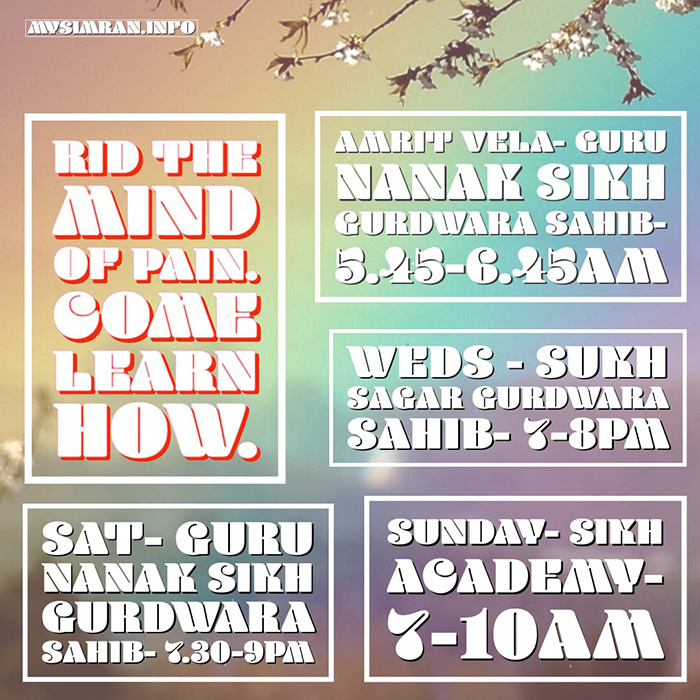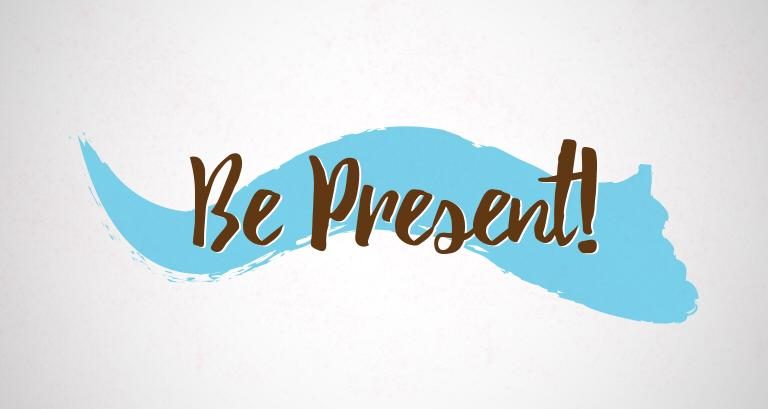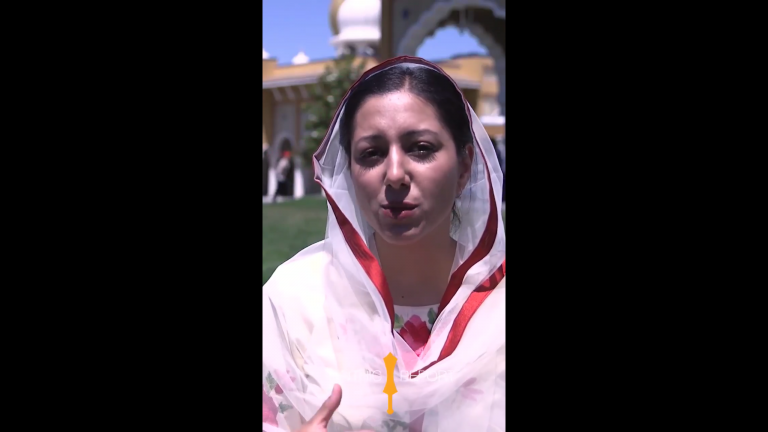Simran is a universal tool for the mind.
Simran is a tool for the mind. It is done using a mantar – a simple phrase you repeat out loud and rhythmically. You can use any two-syllable phrase like “live truth” as long as the phrase doesn’t invoke thoughts. A gurmantar is a tool given by a spiritual Guru for the same purpose. For Sikhs this mantar comes from the ten Sikh Gurus; we use WaheGuru as our gurmantar.
When we do simran, we chant the gurmantar and listen to the sound. When the mind focuses on the sound and not its thoughts, thoughts get reduced and peace and calm come to the mind. In this way anxiety, stress, and other pains the mind experiences get reduced.
Start the change process
Here are three steps to consider when you’re ready.
- Come to the weekly sessions. you can find one in your city by clicking Simran in Your City – mysimran.info
- Do Simran.
- Be consistent.
Weekly Sessions
Weekly Simran sessions are held all over in North American cities. Join in for FREE sessions by contacting the local Volunteer in your city or by clicking the link above. Joining is the first step towards learning how to use this tool for the mind to get rid of anxiety, stress, depression and live a healthy and a happy life knowing you have achieved something very unique in your life.
After you have learned how to use this tool by attending the sessions, take some time to think about the areas that you would like to improve or execute on. This will become much more clear when your mind is in a calm state.
Do Simran
Simran, is the process of being aware of our thoughts. When we do enough Simran, we’re then able to pick the thoughts that we want to take, and then we’re able to tune out the thoughts that don’t serve us.
ਪ੍ਰਭ ਕੈ ਸਿਮਰਨਿ ਮਨ ਕੀ ਮਲੁ ਜਾਇ ॥
In the remembrance of God, the filth of the mind is removed.
Write down the amount of Simran you do in a day and how it is helping you in your life. Revisit that list on a daily, weekly and monthly basis. According to forbes.com, this is why it’s important to write things down: Neuroscience Explains Why You Need To Write Down Your Goals.
Be Consistent
If we’re not consistent with ourselves, then who will be? In order to focus the mind and get rid of anxiety and other diseases of the mind, we need to keep on doing the Simran until we see the results. Remember consistency is the key.
If you’re able to consistently practice what you have learned each day, that will eventually build up to become habitual. Just don’t give up. Keep moving forward. Studies show that it can take longer than the typical 21 days to change a habit: Stop Expecting to Change Your Habit in 21 Days.
Changing your emotional, attitudinal or behavioral habits that have been forged over the years will take time, but it’s possible. Be sure to to go to the sessions where the speakers and the congregation will motivate you to keep doing Simran.
Remember that learning doesn’t bring change, practicing what you have learned does!
How do I manage anxiety at work?
Imagine that you are minutes away from an important presentation to your senior management team. This is the first time that you’ve presented to this group and while you’ve rehearsed your speaking notes many times, you can’t help but feel anxious. As the countdown continues and the minutes turn into seconds, you’re now anxious about being anxious. Will they see that I’m anxious? Will I have what it takes to deliver this presentation? What if I forget everything and make a fool of myself?
Has this ever happened to you? Anxiety usually comes up when you’re extremely worried about something in the future. This could be about an upcoming presentation, an interview for a promotion or even just a monthly touch base meeting with your manager. But we also know that there’s a way to manage that anxiety when it surfaces:
ਚਰਨ ਕਮਲ ਅਰਾਧਿ ਭਗਵੰਤਾ ॥
ਹਰਿ ਸਿਮਰਨ ਤੇ ਮਿਟੀ ਮੇਰੀ ਚਿੰਤਾ ॥੨॥
Worship and adore the Lotus Feet of the Lord God.
Meditating in remembrance on the Lord, my anxiety has come to an end. ||2||
Ultimately, anxiety stems from fear no matter how minimal it might be. Sometimes that fear might be due to not having enough time to prepare, simply not having done the work, or an overwhelming need to impress your manager. Gurbani teaches us that fear is everywhere, but the ‘best’ thing to fear is the Divine:
ਭੈ ਵਿਚਿ ਜੰਮੈ ਭੈ ਮਰੈ ਭੀ ਭਉ ਮਨ ਮਹਿ ਹੋਇ ॥
ਨਾਨਕ ਭੈ ਵਿਚਿ ਜੇ ਮਰੈ ਸਹਿਲਾ ਆਇਆ ਸੋਇ ॥੧॥
In fear we are born, and in fear we die. Fear is always present in the mind.
O Nanak, if one dies in the fear of God, his coming into the world is blessed and approved. ||1||
A Present Mind
Perhaps you have some kind of routine or process to help you when you start to feel anxious. Maybe it’s self talk, breathing deeply or staying hydrated. Why not Simran?
Simran is a tool to help us not let past or future emotions or feelings get the better of us. Through the process of Simran, we learn how to keep our mind present and better manage the extreme highs and lows that we may experience in the workplace. Learn more about The Power of Being Present and Steps to Achieve It.
As we work in our respective industries, let’s remember that mental health is just as important as physical or emotional health. Take the time to declutter your mind, do things that bring you joy, and reflect on how to improve certain skill sets.
Above all else stay present, because a present mind is a powerful mind!
Balancing work with your spiritual life.
Getting a job or starting a business is exciting at any point in life, and often becomes our primary focus. However, this can result in an imbalance between your work life and spiritual life. When this happens, we tend to become less efficient and less happy. Here are a couple of tips to help maintain that balance:
Scheduling is Key
In what often feels like ‘the storm of work’ there is a simple way to keep things organized- keep a schedule. It should be realistic and manageable. A daily or weekly schedule will work wonders in helping you find pockets of spiritual time. At work we often experience changes in project timelines or meetings. When this happens it’s important to revisit your schedule to see where and when you can slot in some quiet meditation time.
Utilize “Free Time”
Although work demands many hours of the day, many of us are able to find some amount of free time. In the same way we find time to eat, we must become active in finding time to feed our Mind. One easy way is to start waking up a bit earlier or wrapping up tasks earlier in the evenings.
Master Tip: Wake up early to get your day started when there are few distractions.
ਉਠਿ ਇਸਨਾਨੁ ਕਰਹੁ ਪਰਭਾਤੇ ਸੋਏ ਹਰਿਆਰਾਧੇ ॥
Rise in the early hours of the morning, and take your cleansing bath. Before you go to bed at night, remember to worship the Lord.
Know your Temple
In the same way we visit our places of worship: Gurdwaras, Temples, Churches, Mosques, etc; remember that our Mind is also a temple, but it requires a custodian to maintain it. We work in this world to take care of the body, but maintaining a strong, healthy and distraction-free mind will propel us spiritually. Be the custodian that your Mind deserves and actively find time to continue on your spiritual journey.
ਮਨੁ ਮੰਦਰੁ ਤਨੁ ਸਾਜੀ ਬਾਰਿ ॥
The mind is the temple, and the body is the fence built around it.
True Occupation
The occupation given to the Mind, is that of spiritual progress towards Naam. By chanting and meditating each second of the day we can learn to remain attuned with Naam, even while working.
ਊਠਤ ਬੈਠਤ ਸੋਵਤ ਨਾਮ ॥ ਕਹੁ ਨਾਨਕ ਜਨ ਕੈ ਸਦ ਕਾਮ ॥6॥
While standing up, sitting down and sleeping, the Naam, says Nanak, is forever the occupation of God’s humble servant. ||6||
As focused as we are in our worldly occupation, let’s employ the same focus in our spiritual progress. After all, our identity isn’t formed by the job we have, rather the quality of the thoughts our mind is occupied with.
Let your pure mind be your identity, and spiritual progress be your occupation. Everything else will fall into place.
New Kirtan: Gur Rasna Amrit Boldee
Seva – Meaning, Purpose and Importance
“Seva” is a Sanskrit word meaning “selfless service” or work performed without any thought of reward or repayment. A Gursikh does seva to progress in his/her spiritual journey and at the same time to contribute to the community. Often we confuse seva with actions that have the veiled or apparent desire to look noble, big-hearted or nice. Let’s learn the meaning of real seva, how it’s done and why it’s important for a Gursikh.
Who does seva?
We do seva using our physical body so that our mind gets to live in a place where there is no ego, only love for Waheguru. That’s why we go to the gurdwara to do different kinds of seva like langar preparation, jorah ghar, doing kirtan, etc. But the key is to be mindful. How is that possible? By doing Simran when performing seva.
If we’re chatting away while preparing langar, or checking our phones while doing jorah ghar seva, then is the mind really present? The body is surely doing the seva but the mind is focused on other things.
Seva is performed for Waheguru, and the love for Waheguru is the only reason to do seva. This love comes from our dhyaan. If our dhyaan is in Simran then it can be considered as true and real seva. If our dhyaan is in worldly affairs then our body is definitely going through the actions of seva but the mind is absent. Our dhyaan on Waheguru through Simran, along with our body doing the physical actions together makes seva meaningful.
Why do seva?
Seva serves two purposes. One, it nurtures the love for Waheguru and the sangat. This love can help a Gursikh in her/his spiritual journey. Though the sevak has no desire for payback or reward, Waheguru can still bless a Gursikh with the wealth of Naam or the company of sat sangat.
Second, seva contributes to the development of a community by bringing it together. Seva done with a true love for Waheguru can inspire others to do the same. When done with dhyaan, seva creates a hunger for spiritual progression.
How to do seva?
When Mata Ganga Ji went to meet Baba Budha Ji with food prepared by her servants, she was denied entry into his home. Baba Ji refused to see her and accept her offerings. After talking to Guru Arjan Dev Ji, Mata Ganga Ji realized her mistake – preparing langar without dhyaan and by others. Next time, Mata Ji prepared the langar herself while doing Simran. She kneaded the dough with her own hands and chopped vegetables for subjee and lovingly prepared the langar. When she went again, Baba Ji was standing outside the village eagerly waiting for her.
Similarly, our mind or dhyaan should be with Waheguru when performing seva. The food becomes Amrit when Simran is done while preparing food.
ਸੇਵਾ ਸੁਰਤਿ ਸਬਦਿ ਚਿਤੁ ਲਾਏ ॥
Center your awareness on seva-selfless
service-and focus your consciousness
on the Shabad.
Paying for janitorial services to clean the bathroom of a Gurdwara or paying for catering to prepare langar robs us of opportunities to do seva. Automation/machines or hired labor can do things for us but then how or when will we learn to put our dhyaan in the service of Waheguru?
What is not seva?
Getting paid for your actions, or your profession is not seva. Doing nice things with an expectation for a reward into the future is not seva.
For example, my uncle, who is a doctor saves people’s lives. Unfortunately, your uncle is not doing seva – he is doing is a job. Being a doctor is his profession. It’s no different than a lawyer who saves an innocent person from going to jail or a police officer who keeps a neighborhood safe. All these professions or duties are done with a reward or repayment in mind.
In another example, my cousin told me that he likes to buy tea for his night shift staff and he sees it as a seva. He also confessed that he expects his staff to be more productive and motivated as a result of this free incentive. The mere expectation of a reciprocal reward deems his actions to be a transaction and not seva. In contrast, when Guru Nanak Dev Ji spent 20 rupees to feed hungry sadhus and saints, he did it out of love for Waheguru. There was no expectation for anything in return. It was a true seva.
The highest form of seva
When we do Simran it’s to focus and put our dhyaan on the Gurmantar. From our love for Gurmantar, we progress towards loving Waheguru. Ultimately this is the process to help us achieve the purpose of our lives, which is to meet Waheguru while alive.
Through Simran, we merge into Waheguru and liberate ourselves. We can then help our families and fellow Gursikhs to walk on this path so they can also get liberated. Simran has the power to transform individuals, families, and communities. The highest form of seva is to liberate ourselves and help others to become liberated from the cycle of life and death, the cycle of karma.
Seva and Simran go together. Let’s make both integral parts of our lives to win our mind and win the world.
Jurassic Coast Day Trip
Summer programs start at Guru Maneyo Granth Gurdwara with Saturday Simran on 6 July, followed by the opening of @withoutshapewithoutform gallery, including the new Immersive Experience on Sunday 7 July. THEN comes a trip to the Jurassic Coast which we have organised in association with @nationaltrust on Saturday 20 July. Coaches will depart from the Gurdwara at 7:30am and return at 8:30pm. The importance of healthy living and nature has been taught & passed down to us by our wonderful Guru’s. This trip, like all that we do @gmggurdwarauk keeps History and Gurbani at it’s core. Open to all – though coach spaces are limited, to avoid disappointment please come to the Gurdwara and register on Sunday 30 June or Sunday 7 July between 3pm-7pm. £15 per seat. We look forward to sharing a wonderful day with you all.u all
Panthic Report 6/8/2019: The impact of the 1984 Sikh attacks, Sikh memorial month
Stay updated with all your Panthic News @ panthicreport.com












